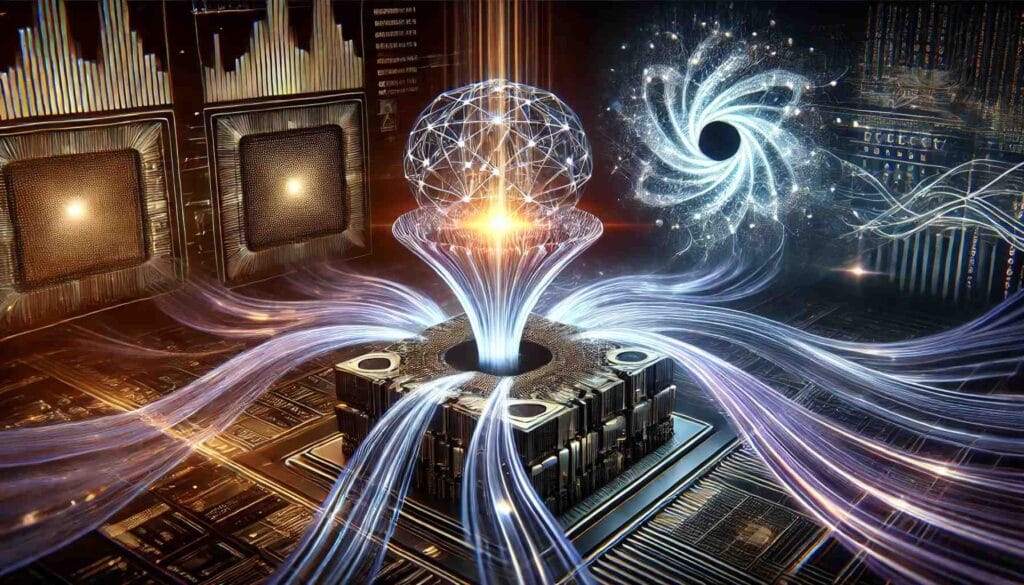The Impact of Quantum Computing on Artificial Intelligence

Quantum computers have the potential to revolutionize the field of artificial intelligence (AI) by enabling faster computations, solving complex problems, and enhancing machine learning algorithms. Here’s a detailed exploration of how quantum computing could impact AI:
1. Faster Processing Power
Traditional computers rely on bits, which represent either 0 or 1, to perform computations. Quantum computers, on the other hand, utilize quantum bits (qubits) that can represent both 0 and 1 simultaneously due to superposition. This allows quantum computers to process and analyze much larger datasets in parallel, significantly speeding up computational tasks. For AI applications like deep learning, this increased processing power could lead to faster training times for models, enabling real-time decision-making in systems that require rapid responses, such as autonomous vehicles or personalized recommendation systems.
2. Enhanced Optimization
One of the most significant contributions of quantum computing to AI lies in optimization problems. Many AI algorithms, especially those used in machine learning, involve finding the optimal solution from a vast number of possibilities. Classical computers struggle with optimization problems as the complexity increases, leading to long computation times. Quantum computers can utilize quantum annealing and other quantum algorithms to solve optimization problems more efficiently. This could greatly enhance areas such as supply chain management, portfolio optimization in finance, and even AI-driven medical research for drug discovery.
3. Improved Machine Learning Models
Machine learning models often require the ability to process and learn from vast amounts of data. Quantum computing can improve the performance of machine learning algorithms by enabling more sophisticated data processing techniques. For example, quantum machine learning algorithms have the potential to discover patterns in data more efficiently than classical approaches. This could lead to more accurate predictions, better decision-making, and the ability to work with more complex, high-dimensional data that would be impractical for classical computers to handle.
4. Quantum Neural Networks (QNNs)
Quantum neural networks (QNNs) are a promising area of research where quantum computing is integrated with neural network architecture. QNNs combine quantum computing’s power with neural networks’ flexibility to enhance the ability of AI systems to learn from data. With the ability to process exponentially larger datasets and solve more complex problems, QNNs could outperform traditional neural networks in tasks such as image recognition, natural language processing, and time-series forecasting.
5. Better Data Security and Privacy
As AI systems handle more sensitive data, security and privacy become critical concerns. Quantum computing could provide new ways to enhance encryption methods, ensuring that data used by AI systems is protected from cyber threats. Quantum cryptography, such as quantum key distribution (QKD), could create virtually unbreakable encryption, making AI systems more secure. Additionally, quantum techniques could help protect user privacy by enabling secure data sharing without compromising sensitive information.
6. New Algorithms for AI Tasks
Quantum computing has the potential to introduce entirely new algorithms that classical computers cannot replicate. These new quantum algorithms could provide solutions to problems that are currently intractable for classical computers, including complex simulations in fields like material science, drug development, and climate modeling. For AI, this means new ways of approaching problems that could result in breakthroughs in efficiency and accuracy.
7. Challenges and Limitations
Despite its potential, quantum computing is still in its early stages, and there are many technical challenges to overcome. For instance, quantum computers are extremely sensitive to noise and require specific conditions (such as low temperatures) to function effectively. Additionally, the development of quantum algorithms for AI is still in its infancy, and it will take time before practical, scalable quantum solutions become widely available.
Conclusion
Quantum computing holds great promise for AI, offering faster processing, enhanced optimization, improved machine learning models, and greater security. However, it is important to recognize that the integration of quantum computing into AI is still in the research and development phase. As quantum technology matures, it could significantly enhance AI capabilities and enable new applications that were previously unimaginable. Nonetheless, the full potential of quantum computing in AI will only be realized as quantum hardware improves and quantum algorithms are further developed.
Source : Medium.com




